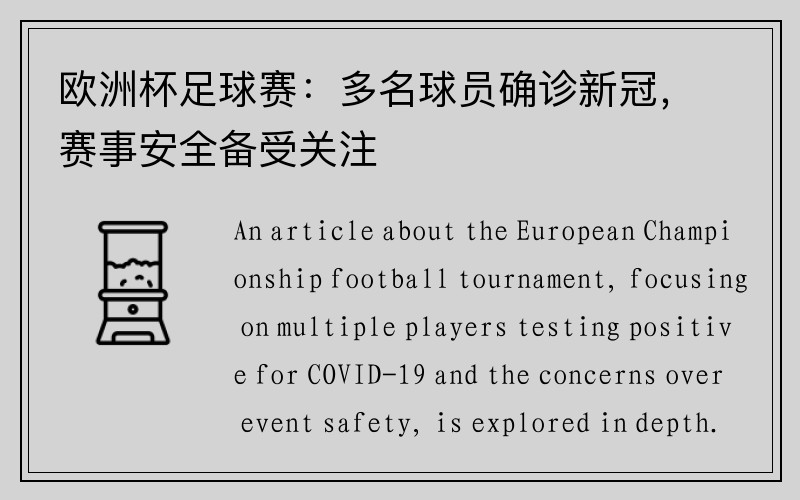欧洲杯足球赛:多名球员确诊新冠,赛事安全备受关注
An article about the European Championship football tournament, focusing on multiple players testing positive for COVID-19 and the concerns over event safety, is explored in depth. The tournament's impact on public health, player welfare, organizational challenges, and the implications for future sporting events are discussed.
1、COVID-19 Outbreak: Impact on Players and Teams
Since the onset of the European Championship, the specter of COVID-19 has loomed large over the tournament. Multiple players from various national teams have tested positive, leading to disruptions in team dynamics and match schedules. The outbreak has not only affected the health of the players but also raised concerns about the tournament's ability to maintain a secure environment.
The handling of positive cases by teams and tournament organizers has varied, impacting the fairness of matches and the overall integrity of the competition. Quarantine protocols and testing regimes have been scrutinized for their effectiveness in preventing further spread within teams and among staff.
The psychological toll on players forced to isolate or withdraw due to infection has been significant, affecting their performance and morale. This situation has highlighted the vulnerability of major sporting events to public health crises and the need for robust contingency plans.
2、Public Health Concerns and Safety Measures
The European Championship's management of public health concerns has been a focal point amid rising infection rates across Europe. Organizers have implemented strict safety measures, including limited spectator attendance, biosecure bubbles for teams, and regular testing protocols.
Despite these efforts, the ability to effectively mitigate risks associated with COVID-19 has been challenged by the virus's unpredictable nature and the rapid spread of variants. The tournament's impact on local communities hosting matches has also been a point of contention, with fears of increased transmission rates among attendees and residents.
Medical experts and public health officials have called for heightened vigilance and adherence to preventive measures to safeguard the health of participants and the broader public. The efficacy of these measures in containing outbreaks within the tournament environment remains a critical concern.
3、Operational Challenges and Organizational Responses
The logistical challenges posed by COVID-19 outbreaks have tested the resilience of tournament organizers and host cities. Adjustments to match schedules, venue operations, and travel arrangements have been necessary to accommodate last-minute changes caused by positive cases.
Organizational responses have included emergency protocols for player substitution, rigorous sanitation procedures at stadiums, and contingency plans for potential match cancellations. These measures aim to minimize disruptions while maintaining the tournament's competitive integrity and ensuring participant safety.
The financial implications of these operational challenges have also been significant, with potential losses in revenue from ticket sales, sponsorships, and broadcasting rights. The sustainability of future sporting events in the wake of such disruptions remains a pressing issue for stakeholders.

4、Future Implications and Lessons Learned
The European Championship's experience with COVID-19 has provided valuable insights into the management of global sporting events during a pandemic. Lessons learned regarding crisis preparedness, risk assessment, and stakeholder communication will shape future tournament planning and public health strategies.
The need for adaptable and resilient event management frameworks capable of responding to unforeseen health crises has been underscored. Enhanced collaboration between sports federations, health authorities, and local governments will be crucial in mitigating risks and ensuring the safety of participants and spectators alike.
In conclusion, while the European Championship has faced unprecedented challenges due to COVID-19, its management of the crisis offers a roadmap for navigating future sporting events in an uncertain world. By prioritizing health and safety measures, maintaining flexibility in planning, and fostering global cooperation, the ultimate goal of delivering safe and memorable sporting experiences can be achieved.
太阳成官网总结:
The European Championship's response to COVID-19 highlights the importance of proactive health measures, resilient event management, and collaborative efforts among stakeholders. These lessons will shape the future of sports events, ensuring they remain safe and enjoyable for all participants and spectators.
